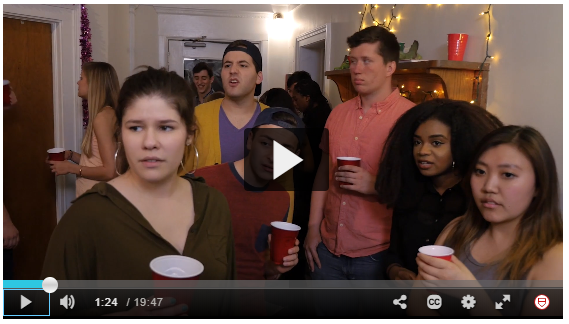PROGRAMS & TOOLS
PREVENTION
PROGRAMMING MATRIX
Intervene
Intervene is a 20-minute film (and a corresponding workshop) demonstrating ways college students can realistically intervene in seven problematic situations.

| Program Name | Level of Evidence | Format | Target Audience | Special Features |
|---|---|---|---|---|
|
Intervene
|
Promising Direction |
|
|
The film covers seven different situations including sexual assault, sexual harassment, intimate partner violence (emotional abuse), hazing, alcohol emergency, emotional distress, and racial bias. |
Methods
Intervene is both a video and a workshop:
- Video: The online 20-minute video Intervene includes seven brief filmed scenarios demonstrating ways in which student bystanders can successfully intervene in situations where the health, safety, or well-being of their peers is at risk. Three of the seven situations addressed focus on sexual violence (sexual assault, sexual harassment, intimate partner violence with a focus on emotional abuse), The other scenes address how to recognize and intervene in situations involving hazing, alcohol emergency, emotional distress, and racial bias. Characters in the film represent the diverse identities of college student populations including race, nationality, religion, gender, sexual orientation, and ability.
- Workshop: An in-person or online 60-minute workshop provides an opportunity for students to view the video with others and engage in a facilitated conversation to reflect upon the attitudes and behaviors that influence the process of intervening as an individual or with assistance. Participants also discuss additional related scenarios not included in the film.
Dosage
- One 20-minute film OR
- One 60-minute facilitated workshop where the film is shown and then discussed.
Logistics
The following resources are available to the public at no cost, in the collaborative spirit of cultivating college health and well-being:
- The video, Intervene (©2016), is available to view and share (but not available for download)
- Facilitator Discussion Guide (PowerPoint)
Theoretical Basis For Approach
Intervene draws upon the Pro-social Bystander Intervention Model by Darley and Latané, which suggests bystanders go through a series of five steps in order to intervene in problematic situations. Intervene also draws upon Albert Bandura’s Social Cognitive Theory, which posits that individuals acquire and maintain behaviors from the power of social influence and observation learning.
Program Effectiveness
A randomized controlled trial (RCT) was conducted to evaluate the impact of viewing the Intervene video online among undergraduate and graduate students. Results are published in Health Communication. Results showed that participants who viewed the video online reported higher likelihood at 4 weeks post-viewing to intervene in situations involving hazing, intimate partner violence, racial bias, and sexual harassment than did their control group counterparts. Intervene is the first video-based bystander education intervention shown to be effective, even 4 weeks after viewing, at increasing college students’ self-reported likelihood to intervene in multiple problematic social situations.
PARTICIPATING COLLEGES AND UNIVERSITIES
- Alfred University
- Aquinas College (MI)
- Augustana College
- Bucknell University
- Calvin University
- Columbia University
- Cornell University
- East Carolina University
- Elizabethtown College
- Fairfield University
- Fontbonne University
- Franklin & Marshall College
- Furman University
- Gustavus Adolphus College
- Hobart and William Smith Colleges
- Hofstra
- Idaho State University
- Ithaca College
- Lahore University of Management Sciences
- Lake Forest Collee
- Le Moyne College
- Lehigh University
- Lindenwood University
- Mansfield University
- Marymount University
- Maryville University
- Marywood University
- Montgomery College
- New York University
- NHTI – Concord’s Community College
- Northeastern University
- Princeton University
- RPI
- Quinnipiac University
- Robeson Community College
- San Francisco State University
- San Jose State University
- Sheridan College
- Southern Arkansas University
- Southern Connecticut State University
- Southern Illinois University – Carbondale
- St. Nobert College
- St. Olaf College
- SUNY Purchase College
- Syracuse Univeristy
- The College of St. Scholastica
- The University of Tennessee at Chattanooga
- Truman State University
- UC Santa Barbara
- Universidad Autónoma de Madrid (Spain)
- University at Albany
- University of Denver
- University of Michigan – Dearborn
- University of Minnesota
- University of Oregon
- University of New Mexico
- University of the Pacific
- University of Scranton
- Ursinus College
- Vassar
- Western Washington University
- William Woods University
Other Entities that have used Intervene:
- West Virginia Foundation for Rape Information and Services
- Kolej Tuanku Ja’afar Primary School in Malaysia
- Rape Response
- Safe Harbors of the Finger Lakes, Inc.
- Vermont Center for Crime Victim Services
- Safe2Tell Colorado – Colorado Attorney General’s Office
CONSIDERATIONS FOR ADMINIsTRATORS
- Intervene has received several awards for its innovative and evidence-based approach to addressing college health concerns.
- Intervene received the 2018 Best Practices: Health Promotion and Education Award from the American College Health Association (ACHA).
- Intervene received the Bronze 2018 Excellence Award from National Association of Student Personnel Administrators in the student health and wellness counseling category.
- The video was screened at the American Public Health Association’s Global Public Health Film Festival in November 2017.
- The video also received the Silver Telly Award in 2017 for non-broadcast productions.
- The vignettes featured in the video are engaging and reflect real-life scenarios of residential college students. This workshop is a great off-the-shelf option to supplement your institutional prevention strategies.
HOW TO ACCESS THIS PROGRAM
Cornell Health offers the video and workshop materials at no cost on their website. They ask that if you use the materials, you complete this short Google form.
Sources
Laura B. Santacrose, Anne C. Laurita & Timothy C. Marchell (2019): Intervene:
Modeling Pro-Social Bystander Behavior in College Students through Online Video, Health
Communication, DOI: 10.1080/10410236.2018.1564956
